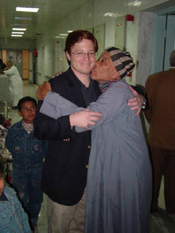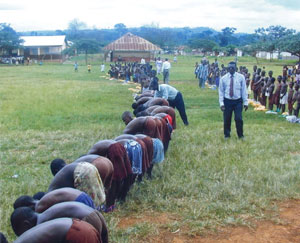Surgeon Volunteerism
Dr. Lonner's Perspective
Upon graduating from medical school, we physicians take the Hippocratic oath. That oath is a standard by which we pledge to uphold the values of relieving suffering and caring for people without regard to personal gain. In this day of managed health care, we spend much of our time and energy on issues of justification of treatment to health insurers, cost containment, and appropriate reimbursement. At times, we may feel that our choice to become physicians was a mistake-that the practice of medicine has veered from the pure nature of the doctor-patient relationship. We are disempowered. Medicine is no longer fun. Morale is down. I am not sure I would want my child to become a doctor. These are thoughts that cross our minds. Having just returned from Ghana, West Africa, where I was amongst a group of orthopaedic surgeons and other healthcare professional volunteers, my view of my role as an orthopaedic spine surgeon has been reinvigorated. The experience of volunteering and treating patients in need in underdeveloped or developing countries is one of great personal reward and professional gratification.

A Grateful Father's Thank You
Dormans, et. al. and Levine1,2 recently addressed the tremendous challenges present in developing countries throughout the world in which infrastructure for healthcare is limited. As pointed out by these authors, two thirds of the world’s population lives in developing countries. Eighty per cent of all orthopaedic surgeons reside in the 26 developed nations in the world. In the developing world, the most common diseases and causes of mortality have been infectious diseases, heart and cerebrovascular diseases. However, as these countries become industrialized and as life expectancy increases, orthopaedic diseases and disorders, such as osteoarthritis and overuse disorders, and trauma will play an ever-increasing role in the needs of these affected societies. Congenital disorders such as myelomeningocele, congenital scoliosis, and clubfoot and polio-related disorders are present in great numbers.3 Therefore, these countries are in need of assistance on many fronts in order to address current healthcare needs and to prepare for the health problems of the near future. We as orthopaedic surgeons have the ability to assist in direct care of patients in these countries now, and more importantly to educate and train existing surgeons and medical personnel and those in training, and to help establish infrastructure by which patients can be evaluated and subsequently treated. My own personal experience in Ghana illustrates these points.

Mass Scoliosis Screening in Ghana
My trip to Ghana arose as a result of an organization entitled FOCOS, The Foundation of Complex Orthopaedic and Spinal Conditions. The aim of the foundation is to treat patients with spinal and other orthopaedic disorders, to educate and train medical personnel and to assist in establishing clinics and hospitals throughout Ghana and in other countries in need of assistance. Efforts include fundraising and raising awareness of the problems that exist in healthcare in Ghana in order to effect change. The FOCOS organization was begun on a small scale, first going to Ghana and Barbados, West Indies with one or two surgeons operating on patients identified by local surgeons. The organization has since grown with groups currently going to Ghana semiannually. The mission will continue to grow as infrastructure improves, more
patients are identified, and the means to pay for the care of the patients is established. Currently, patients requiring surgery are asked to pay a relatively nominal fee if they are able to and orthopaedic implant manufacturers have donated implants. Surgeons with appropriate expertise volunteer their time and often their financial resources, while local orthopaedic surgeons observe and participate in operations. Clinics have been established to evaluate patients and determine surgical candidates for subsequent visits. Clearly, this has drawbacks as some patients in need of more urgent care have delays in treatment. For example, we identified children with severe spinal deformities such as congenital kyphosis that placed these individuals at risk for paraplegia. Ideally, these patients should be treated as soon as possible to avoid progression and neurological injury. Until local surgeons and healthcare providers are adequately trained, these patients wait until the next group of volunteer surgeons arrives.
In addition to direct care of patients, the group of volunteer surgeons provides didactic sessions with formal lectures on various disorders. During the time I spent with the group, lectures on spinal deformity, cervical spine trauma, and clubfoot were given to local healthcare workers and physicians. A practical session on clubfoot casting using the Ponsetti method was conducted as well.4 The dissemination of knowledge to existing physicians and the next generation of surgeons will be crucial in order to help establish a self-sustaining healthcare system.
Political stability and economic growth will also be important in order for the government to begin to build the healthcare system into a viable organization that will be able to deliver uniform, modern care to patients. In Ghana, a former British colony, the main hospitals, Korle Bu Trust Hospital in the capital, Accra, and another hospital in the capital of the Ashanti tribe region, Kumasi, were built by the British in the 1950s and have not been significantly renovated and updated since that era. The economy and political circumstances have not previously allowed for funding and new development. Outside assistance is of crucial importance in helping to build infrastructure. The government of Israel, for example, has funded the building of a new orthopaedic trauma ward at the Hospital in Kumasi. Surgeons and administrators from the ministry of health in that country are actively involved in the development of the facility and in the training of medical staff.
Despite the antiquated environs, our group of volunteers was able to perform eighteen operations in four days. We performed complex spinal reconstructive operations including kyphectomies in young children with congenital kyphosis and vertebral column resection for a patient with a 120§ idiopathic kyphoscoliosis. Amongst the volunteers in our group were two audiologists experienced in state-of-the-art spinal cord monitoring including transcranial motor evoked potential monitoring which helped our team make intraoperative decisions in order to protect the patient. An orthotist in our group assisted in fabricating thoracolumbar sacral orthoses postoperatively and for the non-operative treatment of adolescent idiopathic scoliosis. The local orthotist was given further training by our team. Postoperative physical therapy was immediately instituted in joint arthroplasty patients by a physical therapist on our team. Three scrub nurses were part of our group and also provided valuable advice and training to the local scrub nurses. An anesthesiologist with us was instrumental in providing appropriate hypotensive anesthesia and fluid management for our patients with prolonged operative procedures. Ghanian orthopaedic and neurosurgeons and their residents in training assisted us in the operating room, furthering their training.
At this stage, it is clear that the most complex problems will not be amenable to treatment by the local surgeons. However, they will be able to care for more common problems such as spinal stenosis, osteoarthritis, and trauma. These surgeons are limited by the lack of implants for joint replacement and trauma indications and the overwhelming workload that a handful of orthopaedic surgeons in the entire country are faced with. The Ghanian physicians we worked with were instrumental in preparing patients for surgery, arranging for preoperative testing and medical evaluation and caring for the patients postoperatively and during follow-up. They are eager to advance their knowledge and are appreciative of our efforts. The relationships forged with these individuals as well as amongst our team members will be lasting.
The experience of volunteering as a surgeon in a developing country is rewarding on a professional and personal scale. In my own experience, patients expressed tremendous gratitude, as did the local healthcare community including physicians, nurses, and other staff. Our group was honored by the Ashanti tribe King at a public ceremony in which the King voiced his appreciation. The visit to Ghana was an interesting cultural experience. The ten days I spent in Ghana reaffirmed my decision to become a surgeon, reminding me of the sanctity of the doctor-patient relationship and the important role we as physicians can play in the lives of individuals. On a practical level, one is exposed to disorders that are less commonly seen in the industrialized world and with greater severity. Thus, the time spent treating patients as a volunteer is also one of personal learning and advancement, allowing one to bring valuable lessons to the care of patients back home. The experience is equally valuable for a young physician in the early stages of his career as well as for more experienced surgeons. I personally intend to devote time each year to volunteer work in other countries. I also foresee myself devoting more time as I approach retirement later in my career. I highly recommend this path for other orthopaedic surgeons and healthcare professionals.
References
- Dormans, JP; Fisher, RC; Pill, SG. Orthopaedics in the developing world: Present and future concerns. J Am Ac Orthop Surg, 9 (5):289-296, 2001.
- Levine, A. Can we make a difference? J Am Ac Orthop Surg, 9(5):279, 2001.
- Fisher, RC. Selected conditions common in the developing world. Instr Course Lect, 49:585-591, 2000.
- Ponsetti, IV. Clubfoot management. J Pediatr Orthop, 20(6):699-700, 2000.
